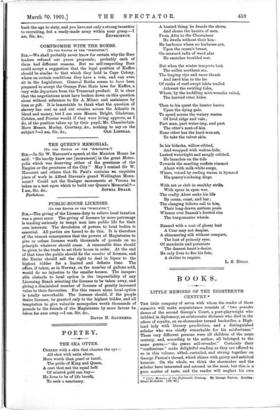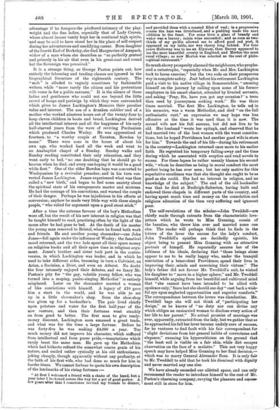BOOKS.
LITTLE MEMOIRS OF THE EIGHTEENTH CENTURY.*
THE little company of seven with whom the reader of these memoirs will make acquaintance consists of "two grand,es dames of the second George's Court, a poet-playwright who dabbled in diplomacy, an aristocratic declassee who died in the odour of royalty, an ex-shoemaker turned bookseller, a High- land lady with literary proclivities, and a distinguished scholar who was chiefly remarkable for his misfortunes." These very different persons were all children of the some century, and, according to the author, all belonged to the same genus,—" the genus self-revealer." Certainly their " confessions " make delightful reading as they are offered to us in this volume, sifted, curtailed, and strung together on George Paston's thread, which shines with gaiety and satirical humour. On the whole, we think the shoemaker and the scholar have interested and amused us the most, but this is a pure matter of taste, and the reader will neglect his own • LitCe Memoirs of the Eighteenth Century. By George Parton. London : Grant Richards. floe. 6d.) advantage if he foregoes the proffered intimacy of the play- wright and the fine ladies, especially that of Lady Craven, whose almost insane vanity kept her in continual high spirits, 'and may be said to have stood her in the place of self-respect during her adventurous and unedifying career. Born daughter of the fourth Earl of Berkeley, she died Margravine of Anspach, widow of a man whom she describes as "so perfectly genteel. and princely in his air that even in hie great-coat and round hat the Sovereign was perceived."
It is a strange thing, as George Paston points out, how entirely the labouring and trading classes are ignored in the biographical literature of the eighteenth century. The " mob " is alluded to vaguely sometimes by fashionable writers, while "more rarely the citizen and his pretentious wife come in for a polite sarcasm." It is the silence of these ladies and gentlemen who could not see beyond the little crowd of hoops and periwigs by which they were surrounded which gives to James Lackington's Memoirs their peculiar value and interest. The son of a drunken cobbler and of a mother who worked nineteen hours out of the twenty-four to keep eleven children in boots and bread, Lackington derived all the intellectual interest and all the happiness of his early half-starved years from the wave of reviving Puritanism which produced Charles Wesley. He was apprenticed at fourteen. to "a worthy couple at Taunton, Bowden by name." There were sons in the house of about his own age, who worked hard all the week and went to an Anabaptist chapel of a Sunday. Sunday walks and Sunday reading constituted their only relaxation, and they went early to bed, "no one doubting that he should go to heaven when be died, and every one hoping it would be a good . while first." One of the elder Bowden boys was converted to Wesleyanism by a revivalist preacher, and in his turn con- verted James Lackington. James experienced what was then called a "new birth," and began to feel some anxiety about the spiritual state of his unregenerate master and mistress. He had the courage of his convictions, and warned the couple of their danger. Perhaps he was injudicious in his efforts at conversion; anyhow be made very little way with these simple people, " who relied for argument upon a good stout stick."
After a time the extreme fervour of the boy's Methodism wore off, but the result of his new interest in religion was that he taught himself to read, practising often by the light of the moon after he had gone to bed. At the death of his master the young man removed to Bristol, where he found both work and friends. He and another young shoemaker—one John Jones—fell again under the influence of Wesley; the fanatical mood returned, and the two lads spent all their spare money on religious books and all their spare time in religious argu- ment. Jones's brother and sister took part in the contro- versies, in which Lackington was leader, and in which he used to take different sides, becoming in turn a Calvinist, an Arian, a Socinian, a Deist, and even an Atheist. No doubt the four intensely enjoyed their debates, and we fancy Mr. Paston's pity for "the gay, volatile young fellow, who was turned into a moping, psalm-singing Methodist" is entirely misplaced. Later on the shoemaker married a woman of like convictions with himself. A legacy of 210 gave him a start in the world, and he was able to set up in a little shoemaker's shop. Soon the shoe-shop was given up for a bookseller's. The pair lived chiefly upon potatoes and water for the first half-year of the new venture, and then their fortunes went steadily on from good to better. The first man to give ready. money discount, Laekington soon amassed a great trade, and what was for the time a large fortune. Before he was forty-five he was making 24,000 a year. Too mach money did not improve his character, which suffered from intellectual and from purse pride,—temptations which rarely beset the same man. He gave up the Methodism which had hitherto refined the somewhat coarse grain of his nature, and smiled rather cynically at his old enthusiasms, joking cheaply, though apparently without any profanity; at the faith of his first wife, who had done so much for him in harder times. We cannot forbear to quote his own description
of the landmarks of his rising fortunes :— .
" At first I welcomed a friend with a shake of the hand, but a year later I beckoned across the way for a pot of good porter. A few years after that I sometimes invited my friends to dinner, and provided them with a roasted fillet of veal ; in a progressive course the ham was introduced, and a pudding made the next addition to the feast. For some time a glass of brandy and water was a luxury ; raisin wine succeeded ; and as soon as two- thirds of my profits allowed me to afford good red port, it appeared on my table, nor was sherry long behind. For four years Holloway was to me an Elysium, then Surrey appeared to me the most beautiful county in England, and Merton the most rural village ; so now Merton was selected as the seat of philo- sophical retirement."
So much showy prosperity alarmed the neighbours, who prophe- sied a catastrophe, "especially when Mr. and Mrs. Lackington took to horse exercise," but the to rode on their prosperous way in complete safety. Just before his retirement Lackington paid a visit to his native village in Somersetshire, "amusing himself on the journey by calling upon some of his former employers in his smart chariot, attended by liveried servants, and asking Pray, Sir, have you got any occasion?' a term
then used by journeymen seekino. work." He was three times married. The first Mrs. Lackington, he tells us in his memoirs, was a warm Methodist, and died "on the full enthusiastic rant," an expression we may hope was less offensive at the time it was used than it is now. The gecond wife saw his full success, but did not live to be Old. Her husband "wrote her epitaph, and observed that he had married two ' of the best women with the worst constitu- tions, but he hoped Providence had another good wife in store for him." Towards the end of•his life—during his retirement in the country—Lackington returned once more to his earlier faith. He regretted his temporary falling-away and the time during which he associated with sceptics and read novels to excess. For these lapses he rather meanly blames his second wife, "whom he describes as being in moral conduct the most perfect being he has ever seen ; but her only motive for this superlative excellence was that she thought she ought to be as good as she could. She had no interest in religion, and no knowledge of the subject." The end of the old bookseller was that he died at Budleigh-Salterton, having ,built and endowed three chapels in different parts of the country, and having spent much time and money on the consolation and religious education of the then very suffering and ignorant poor.
The self-revelations of the echolar–John Tweddell—are chiefly made through extracts from the characteristic love- letters which he wrote to Miss Gunning, cousin of the beauties, who threw him over and married some one else. The reader will perhaps think that he finds in the letters of the lover the excuse for the lady's conduct. John Tweddell's epistles are decidedly egoistic, his object being to present Miss Gunning with an attractive portrait of himqelf. He repeatedly assures her of the loftiness of his ideals, declaring that "those beings alone appear to me to be really happy who, under the tranquil conviction a a benevolent Providence, spend their lives in improving their , minds and exercising their virtues." The lady's father did not favour Mr. Tweddell's suit, he wished his daughter to "move in a higher sphere," and Mr. Tweddell himself, while arguing from her beautiful and cultivated mind that "she cannot have been intended to be allied with opulence only," fears lest she should one day" cast back a wish- ful eye upon neglected opportunities and superior comforts." The correspondence between the lovers was clandestine. Mr. Tweddell begs she will not think of, "participating her design," as he knows of "no duty nor can divine any which obliges an unniarried woman to disclose every action of her life to her parent." No actual promise of marriage was ever, apparently, extracted from the lady, but we gather that as be approached his fall her lover became unduly sure of success, for he ventures to find fault with his fair correspondent for "slight deviations from her general habits of correctness and elegance," excusing his hypercriticism on the ground that "the least soil is visible on a fair skin, while dirt escapes observation on the face of a mulatto?' This not very happy speech may have helped Miss Gunning to her final decision,—
which was to marry General Alexander Ross. It is only fair to Mr. Tweddell to add that he took his dismissal with dignity and never married any one else.
We have already exceeded our allbtted space, and can only recommend the reader to introduce himself to the rest of Mx.
Paston's charming company, envying the pleasure amt axnuse- ment still in store for him.







































 Previous page
Previous page